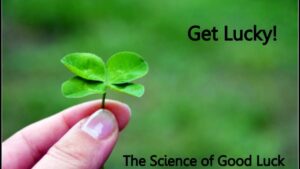Have you ever bought a lottery ticket and missed out on a million dollars because the last number didn’t match?
Your favourite soccer player squandered a penalty kick?
You missed the train by a whisker!
You’ve had such bad luck!
It happens a lot to us.
And we just say one word at a time. That’s a bad omen.
This indicates that you are unlucky.
In other words, the concept of luck is quite real.
That is why we term things lucky and, to be more accurate, unlucky at times.
As a result, we can assert that the term “luck” exists.
Is luck, on the other hand, truly gone?
According to Mental Floss, the term “luck” is Middle Dutch in origin. The name derives from the word luc, which is a contraction of the phrase gheluc, which means “pleasure, good fortune.” The term was most likely first used in the English language as a gaming term in the 15th century.
You can relate to Cuban great President Fidel Castro’s life as far as luck is concerned.
According to Cuba’s counter-intelligence agency, Fidel Castro has survived over 630 assassination attempts! Six hundred and thirty dollars. The US CIA, many mafia members, and his own mistress, among many others, are all involved in a number of these plots.
Fidel has survived poisoned cigars, exploding cigars, LSD-laced radios, hidden toxic hypodermic needles laden with lethal concoctions, and much more.
Of course, he was extremely lucky!
So, you can’t deny that luck exists.

Researchers from a variety of areas have tried to figure out if there is a quantitative part to what we call luck. Many of these studies have discovered that what a person perceives as “luck” has less to do with probability and more to do with psychology; “luck” is simply one’s own optimistic attitude that keeps one open to new chances or seeing patterns in random acts of chance.
Science has just demonstrated that we can re-create our own luck. This ground-breaking study provides many evidence-based strategies for stumbling into the next big opportunity.

If physical determinism is correct, then every event is completely predictable.
Clearly, luck is a mental state. Is there more to it? Dr. Richard Wiseman, Professor of Public Understanding of Psychology,
established a “luck lab” at the University of Hertfordshire in England to investigate this subject scientifically.
Dr. Wiseman started by seeing if people who think they’re lucky are more likely to win the lottery. He enlisted 700 people
who were planning to buy lottery tickets to fill out his luck questionnaire, which is a self-report scale that determines
whether people
believe they are lucky or unlucky.
Despite the fact that lucky people were twice as likely as unlucky people to win the lottery,
there was no difference in winnings.
Dr Wiseman then gave the participants a standardised “life happiness” scale, which asks them to rate their contentment with
their family, personal life, financial condition, health, and career.
The outcomes were stunning.
In his delightful and incisive book, The Luck Factor, Wiseman finds that “fortunate people are
significantly more
content with all aspects of their lives than unlucky or neutral persons.”
Does it satisfy that luck if exits can be scientifically enhanced in order to obtain a miracle in life? Yes, it does. Of course, luck is a state of mind that transfers into actual life outcomes. Do you think you’re lucky? Here’s how to do it.
Let’s go over some of the stories from the Luck Experiments before we get into the steps. Dr Wiseman started by interviewing thousands of people who thought they were lucky or unlucky.

So, perhaps you aren’t as unlucky as you believed.
Despite encountering setbacks in life, embracing some of Dr Wiseman’s research findings and establishing some new behaviours
in your life could make you luckier.
So let’s get started; here’s how you may use science to increase your luck and move from unfortunate to lucky in no time,
allowing you to find miracles in life.
# The Newspaper Effect – The Center of Attention
One of the most intriguing distinctions between lucky and unlucky people is the focus of their attention. Lucky people are continuously on the lookout for opportunities in the mundane aspects of life. Whereas the unlucky are more likely to move forward without paying notice or hoping for luck. Dr Wiseman’s “Newspaper Experiment” proved and illustrated this idea.
Dr Wiseman started by asking individuals if they were lucky or unlucky. They were then instructed to count the number of photographs they viewed while flipping through a newspaper. They would be given $100 as a prize.
What he didn’t tell the audience was that the newspaper had two significant time-saving opportunities.
“One was a half-page ad that read, “Stop Counting.
The other was a half-page ad that said, “Tell the experimenter you saw this ad and collect your $100 now,” and there were 42 images in the newspaper.
Dr Wiseman recalls.
The results were unmistakable.
Those who thought themselves fortunate spotted the ad and instantly grabbed their money.
Those who labelled themselves as unlucky sat and numbered each advertisement, missing the
important time-saving lesson.
When people who thought they were unlucky were pushed, stressed, or worried, their focus constricted, they put their heads down and went through the motions of the work. Those who described themselves as lucky, on the other hand, focused their attention on an attempt to understand the details of what they were doing. Getting them “lucky” and noticing this time-saving message. Studies demonstrate that if we take the time to slow down, pay attention to what we’re doing, and believe in our luck, we will be.
# Make a note of it
Dr Wiseman’s next experiment was to explore if we could genuinely change our fortune. Dr Wiseman adds, “We thought, if we take a group of people who aren’t particularly lucky or unlucky and encourage them to think and behave like a lucky person, will it boost their luck?”
The subjects were advised to keep a “luck journal” in order to change their views. “We asked that at the end of each day they write down the most positive thing that happened or the most positive thought they had that day,” Dr Wiseman explains the rules. Or, in certain circumstances, something bad that used to happen but no longer does, or at the very least a grateful thought.”
The participants who kept these notebooks soon reoriented themselves. They began to see the positive aspects of their lives and the chances that lay ahead of them. Dr Wiseman points out that the simplest interventions had the most impact. Journaling and writing down thoughts has been shown to offer significant mental health advantages. We reprogram our brains to see more potential in each day by focusing on the positive that happens each day. As a result, we feel more “fortunate” each day. In this manner, you can increase your lucky quotient and start seeing miracles in your life.
# Make Your Bad Luck Work For You
It’s difficult to quit once you’ve started focusing on the positive. Carol Dweck, a Stanford University psychology professor, was the first to invent the term “growth mindset.” One of the major foundations of a growth mindset, according to her book Mindset: The New Psychology of Success, is learning and seeing the positive in everything.
If you try something and fail, don’t be too hard on yourself; instead, concentrate on what you learned and how you might avoid making the same mistakes again. This keeps us moving forward and increases our perception of how “lucky” we will be in the future because we now know what not to do.
Result?
Miracles will occur in your life as a result of your efforts to reintroduce luck into your life.
It’s amazing how much your perspective changes when you think you’re lucky all of the time. “A lucky person would take something as unpleasant as falling down the steps and find the good,” Dr Wiseman says. Sure, I fractured my leg falling down the steps, but if I had landed slightly to the left. I would have shattered both of them, so I consider myself lucky.”
# Change Shouldn’t Scare You
You might believe that breaking one leg is still a bad result. Those who educate their brain to think of themselves as lucky, on the other hand, do not dwell on the negative but instead seek out the positive, shift their emphasis there, and move forward.
As Dr Wiseman says, some people actually love being unlucky. “Approximately 20% of unlucky people like to be unlucky. Their sense of self-identity is entwined with that.” This 20% enjoys being the clumsy guest at a party and never having things go according to plan because it provides them with an excuse on some level.
According to the experiments, reaching these people is incredibly difficult. While thinking lucky has the power to transform your life, you must want to change in order for it to happen.
Conclusion:
So, the next time you find yourself unlucky due to a set of circumstances, why not give Lucky a meaningful acronym? Living Under Correct Knowledge Yearly.
As you may be aware, some students who have positive exam results attribute their success to chance, while others attribute their success to the fact that they studied well and so empower themselves by claiming responsibility for their effort.
Because LUCK stands for Laboring Under Correct Knowledge, this is the second approach to reproduce luck in your life.

Success was once associated with hard labour in previous generations. Faith in luck has supplanted faith in hard effort and religion in today’s fast-paced digital age with information overload and glitzy society.
One thing that both luck and religion have in common is that they both provide hope. However, empowering oneself and becoming more active in order to generate one’s own “luck” is preferable to waiting to be lucky.
We hope that having gained such valuable insight on luck, you would share it with others and advise them to approach luck as a stirring force in their lives the next time they are unlucky. Look at its beauty and try to make sense of it.
Isn’t that something we do all the time?
-End-




